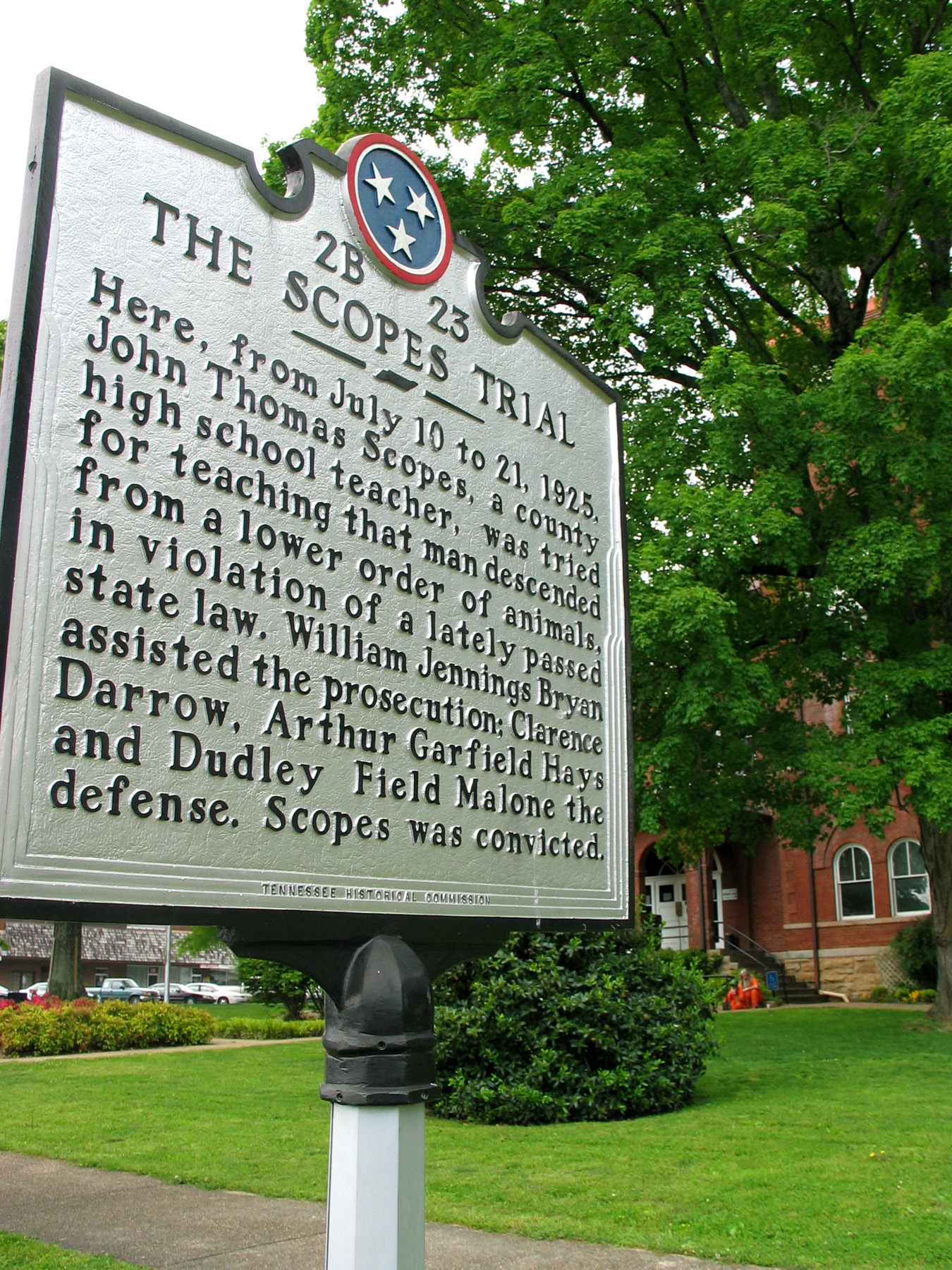
DAYTON, Tenn. (BP)–Tucked behind towering trees along the quiet main street of Dayton, Tenn., the grand redbrick courthouse once was the setting for a trial that continues to affect worldviews 80 years later.
John Thomas Scopes, a first-year schoolteacher, was prosecuted by the state at the Rhea County Courthouse in July 1925 on charges of teaching evolution in a high school classroom.
The so-called “Scopes Monkey Trial” received international media attention and continues to influence the creation vs. evolution debate more than three-quarters of a century later.
“It’s not the trial, but the distortion of the trial that had an impact,” said Marvin Olasky, coauthor of a new book, “Monkey Business,” that seeks to set the record straight to readers whose opinions and stereotypes may be largely based on inaccurate media coverage of the 1925 trial.
“The journalistic coverage led to a stereotype in American life of essentially the smart evolutionist vs. the stupid creationist,” said Olasky, editor in chief of World magazine and journalism professor at the University of Texas, Austin.
The Broadman & Holman division of LifeWay Christian Resources of the Southern Baptist Convention released the book that Olasky coauthored with John Perry.
Olasky said reporters flocked to the “trial of the century” with mostly selfish agendas.
“Reporters were in a propaganda frame of mind and were looking to promote their religion,” he said. “It was a perfect example of how religious and ideological views of reporters strongly influence their coverage.”
While researching Monkey Business, the authors examined countless newspaper accounts, conducted interviews with experts and read the official court transcript, which Perry said differs greatly from the story most people know.
“[Monkey Business] gave us the chance to unscramble the misrepresentations of what happened, of what creation science is and who creation scientists are,” said Perry, editor of Home and Christian Life Review.
The Scopes trial began as a public relations campaign organized by Dayton town leaders who wanted to boost the town’s economy after a triad of mining accidents had devastated the area.
Town leaders responded to an American Civil Liberties Union advertisement outlining the organization’s desire to challenge Tennessee’s new Butler Act that made it illegal to teach any theory contrary to divine creation. Leaders convinced Scopes to become the defendant even though, as he later wrote in his autobiography, he couldn’t recall ever teaching evolution.
The publicity stunt succeeded initially as about 200 reporters descended on Dayton in July 1925, and stories about the trial made headlines as far away as Japan.
Unfortunately, most of the stories the press generated cast a negative light on Dayton, its residents and creationists in general that still affects public conscience today.
“Their interpretations of events are more familiar today than the events themselves,” the authors write in Monkey Business. “The facts of the case have been obscured by half-truths and pure fiction.”
Perry and Olasky said they hope the book can rectify 80 years of historical understanding based mostly on the words of opinionated reporters such as H.L. Mencken, a renowned journalist with The Baltimore Sun.
According to Monkey Business, before the trial even began Mencken wrote that “so-called religious organizations which now lead the war against the teaching of evolution are nothing more, at bottom, than conspiracies of the inferior man against his betters.”
Olasky said one of the most frustrating assumptions concerning the Scopes trial is that it was a battle of science vs. religion. That mindset implies that beliefs are tied to a person’s level of intelligence.
“The battle then and the battle now is not science vs. religion,” Olasky said. “It’s the battle of two religions, of two worldviews. Both views are held by intelligent people.
“It’s not smart against stupid.”
Scopes never returned to teaching after a jury found him guilty, but that doesn’t mean classrooms haven’t felt his influence.
Perry said the debate between evolution and creation continues to rage throughout the country because “what you think about where you came from affects everything.”
According to a recent Gallup poll, 38 percent of 13- to 17-year-olds believe God created human beings. Forty-three percent believe humans “developed over millions of years from less advanced forms of life, but God guided” the process.
Olasky said those statistics show that schools don’t have much effect on students’ beliefs concerning the origin of man. “There’s a natural human tendency that evidently can’t be beaten out of people that something can’t come out of nothing, and that is essentially what schools are trying to teach.”
Perry would like to see Monkey Business used in classrooms as an accurate record of the Scopes trial instead of literature such as the play “Inherit the Wind,” which veers greatly from the court transcripts of the case, but often is the only exposure students receive to the trial.
“If you’re educating your children properly, you must present them with all the facts,” Perry said. “People need to know they don’t know the truth about the Scopes trial, they don’t know the truth about evolution, they don’t know the truth about creationism.”
–30–
“Monkey Business” is available at LifeWay Christian Stores, and online at www.lifewaystores.com.














